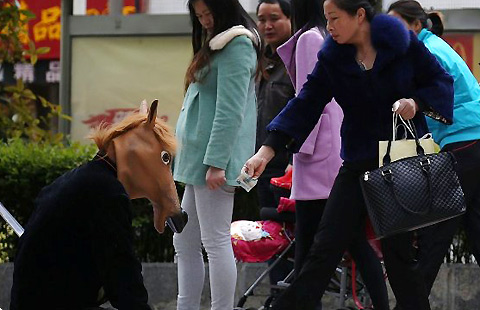China's economy steps into 'new normal', no turning back
Updated: 2015-04-17 09:30
(Xinhua)
|
||||||||
Fan Jianping, chief economist at the State Information Center, pointed to the changes in the industrial sector as evidence for the transformation in the Chinese economy.
While industrial output grew 6.4 percent year on year in the January-March period, down from 8.7 percent growth a year ago, the industrial structure continued to improve.
The industrial value added of the high-tech sector and equipment manufacturing jumped by 11.4 percent and 7.7 percent respectively in the first quarter, outpacing overall growth.
In 2014, the country's spending on research and development (R&D) accounted for 2.1 percent of GDP, a record high. The proportion in some regions such as Shanghai reached up to 3.6 percent.
A focus on innovation has made some Chinese companies, such as telecommunications giant Huawei, climb up the value chain.
The Shenzhen-based company, which was on a shoestring budget at the time of its founding in 1987, reported a 32.7 percent increase in profits in 2014 to 27.9 billion yuan. Its revenue grew to 288 billion yuan, up 20.6 percent.
A close look at the company's track record reveals its main driver of growth is its attention to innovation and R&D. In 2014, 40.8 billion yuan went toward R&D, 29.4 percent more than in 2013 and 14 percent of the company's revenue.
In the past decade, Huawei has spent more than 190 billion yuan on R&D. Of its 150,000 employees, more than 45 percent are in innovation, research and development positions.
There is still a lot more potential and room for China's manufacturing sector and companies to upgrade themselves, and this will be where the future of the Chinese economy lies, J.P. Morgan China chief economist Zhu Haibin told Xinhua in an interview.
While overcapacity is cut in energy-intensive sectors such as steel and cement, the output of which slumped 3.6 percent and 20.5 percent respectively, growth of emerging sectors will accelerate and play a key role in the long-term development of the economy, Zhu said.
In addition to innovation, the "Internet Plus" action plan unveiled by Premier Li Keqiang during the parliamentary sessions in March will serve as another new engine for future sustainable growth, Zhu added.
The plan aims to integrate mobile Internet, cloud computing, big data and the Internet of Things with modern manufacturing. It will also encourage the healthy development of e-commerce, industrial networks, and Internet banking and help Internet companies increase their international presence.
In addition to Internet giants such as Alibaba, Baidu and Tencent, many traditional companies are also looking to the Internet as a tool to transform themselves.

 Top 10 industries with most job-hoppers
Top 10 industries with most job-hoppers
 Russia honors Chinese veterans from WWII
Russia honors Chinese veterans from WWII
 Woman embroiders giant painting
Woman embroiders giant painting
 HK singer-actress Mok takes fans on global journey
HK singer-actress Mok takes fans on global journey
 Sandstorm engulfs North China
Sandstorm engulfs North China
 Qinghai quake: Reliving the memory
Qinghai quake: Reliving the memory
 Father horses around to save his son
Father horses around to save his son
 Ten photos you don't wanna miss - April 15
Ten photos you don't wanna miss - April 15
Most Viewed
Editor's Picks

|

|

|

|

|

|
Today's Top News
US-listed Chinese tech stocks not bubbly: analysts
AIIB praised, US criticized by experts
Japan tops China as top holder of US debt
Q1 economic data: what the economists say
AIIB to operate in 'transparent way'
China-Canada Year kicks off
Paulson: US should have joined AIIB
Economic reforms in China are 'needed'
US Weekly

|

|







